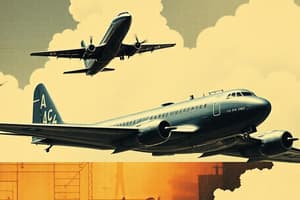Podcast
Questions and Answers
Which axis of flight is responsible for an airplane's ability to roll or turn?
Which axis of flight is responsible for an airplane's ability to roll or turn?
- Lateral axis (correct)
- Longitudinal axis
- Vertical axis
- None of the above
What is stability in aviation?
What is stability in aviation?
- The tendency of an aircraft to return to trimmed position after disturbance in an air stream (correct)
- The ability for the aircraft to commence and sustain maneuvers
- The response of an aircraft in steady flight on the pilot control input
- None of the above
What is maneuverability in aviation?
What is maneuverability in aviation?
- The tendency of an aircraft to return to trimmed position after disturbance in an air stream
- The ability for the aircraft to commence and sustain maneuvers (correct)
- The response of an aircraft in steady flight on the pilot control input
- None of the above
What is controllability in aviation?
What is controllability in aviation?
What are the four forces of flight?
What are the four forces of flight?
Flashcards
Lateral Axis
Lateral Axis
The axis that runs from wingtip to wingtip, affecting roll.
Stability (Aviation)
Stability (Aviation)
Aircraft's tendency to return to its original position after being disturbed.
Maneuverability (Aviation)
Maneuverability (Aviation)
The ability of an aircraft to perform maneuvers readily.
Controllability (Aviation)
Controllability (Aviation)
Signup and view all the flashcards
Four forces of flight
Four forces of flight
Signup and view all the flashcards
Study Notes
Axis of Flight
- The longitudinal axis is responsible for an airplane's ability to roll or turn.
- Rolling movement occurs around the longitudinal axis, allowing an aircraft to bank during turns.
Stability in Aviation
- Stability refers to an aircraft's ability to maintain a steady flight path without uncontrolled deviations.
- Types of stability include static (resistance to immediate disturbance) and dynamic (resistance over time).
- Aircraft designs may emphasize positive stability to ensure easier handling.
Maneuverability in Aviation
- Maneuverability defines how easily an aircraft can change its flight path.
- High maneuverability enables rapid changes in direction and altitude.
- Factors influencing maneuverability include wing design, control surfaces, and weight distribution.
Controllability in Aviation
- Controllability concerns how effectively a pilot can manipulate an aircraft's flight path.
- Good controllability allows for responsive and precise manipulation of flight controls.
- It directly impacts the likelihood of executing complex maneuvers safely.
Four Forces of Flight
- The four forces are lift, weight, thrust, and drag.
- Lift is generated by the wings and opposes weight, which is the force of gravity acting on the aircraft.
- Thrust is produced by engines and propels the aircraft forward, while drag is the air resistance that opposes thrust.
Studying That Suits You
Use AI to generate personalized quizzes and flashcards to suit your learning preferences.




